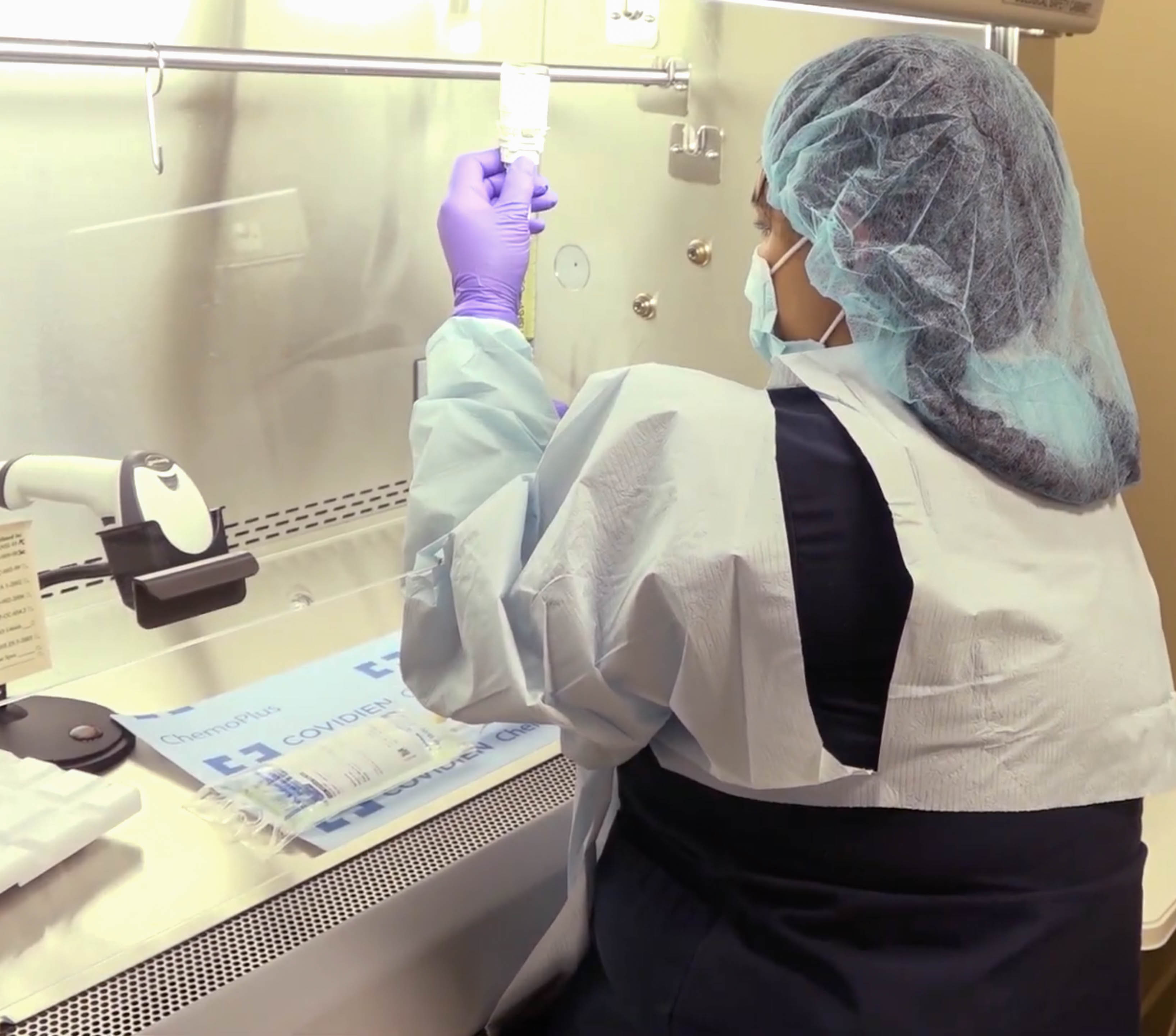
Prescription Precision
On the surface, the pharmacy at The University of New Mexico Comprehensive Cancer Center looks pretty familiar.
There’s the counter, the shelves and the helpful faces working with customers.
But a retail pharmacy is just one part of a larger operation that is integrated into nearly every function of the UNM Comprehensive Cancer Center’s clinical operations.
Pharmacists work with oncologists and oncology nurses to make sure chemotherapy dosages are correct for patients undergoing treatments at the center, while the team of pharmacists in the retail side work to make sure patients understand the medications they’re taking home – and even look for ways to help them pay for it.
 “In our retail pharmacy, we help everyone who comes in the door for any prescription or over-the-counter medication,” said pharmacy director Nick Crozier. “In addition, we help all oral oncology patients, no matter where they fill their prescriptions. We do an initial consultation and go in depth about what to expect and then we follow up with the patients to make sure everything is OK.”
“In our retail pharmacy, we help everyone who comes in the door for any prescription or over-the-counter medication,” said pharmacy director Nick Crozier. “In addition, we help all oral oncology patients, no matter where they fill their prescriptions. We do an initial consultation and go in depth about what to expect and then we follow up with the patients to make sure everything is OK.”
Oncology drugs can be complicated and expensive. The pharmacy team makes sure patients understand what they are taking and helps them make their way through the insurance process as well.
“Not only does the pharmacy staff deal with insurers, a big part of what we do is we look for additional funding for patients without insurance, or who need help with co-pays,” Crozier said.
It takes a dedicated team of professionals, many of whom have undergone specialized training to become board certified in oncology pharmacy.
Pharmacists and technicians work together to make sure the dosages provided to patients who receive treatment at the Comprehensive Cancer Center’s clinics are safe and effective.
Chemotherapy treatments can require combinations of drugs, and the communication and documentation of what goes into the mix is absolutely crucial, Crozier said.
“The inventory just has to be absolutely perfect, otherwise we may not be able to treat a patient on the day they are due,” he said.
Every detail of the medication order is scrutinized so that the medication order that’s sent to the technician for mixing is completely accurate, Crozier said.
Technicians undergo specialized training as well, including learning the proper order in which to mix certain drugs.
“There are unique things that a tech needs to know to work in oncology, and it usually takes about six months,” Crozier said.
If a drug isn’t mixed properly, it often must be thrown away, because each dose is unique for a patient.
But even before a patient comes in for treatments, the Comprehensive Cancer Center’s pharmacists are involved in that patient’s care, working with oncologists to determine which drugs might work the best.
“When they’re working downstairs with the doctors, they’re looking at the disease state, prior lines of therapy and the tumor markers,” Crozier said. “They help pick the right drug regimen for the patient.”
When patients come in for their treatments, pharmacists are behind the scene helping determine if it’s appropriate for them to receive treatment that day based on the patient’s laboratory test results. Pharmacists also rotate in the UNM Hospital inpatient cancer unit, because many cancer treatments require hospital stays.
As a part of the UNM Health Sciences Center, the Comprehensive Cancer Center also offers educational opportunities, including a one-year oncology residency for pharmacists looking to expand their knowledge before entering the workplace.
UNM Comprehensive Cancer Center
The University of New Mexico Comprehensive Cancer Center is the Official Cancer Center of New Mexico and the only National Cancer Institute-designated Cancer Center in a 500-mile radius.
Its more than 136 board-certified oncology specialty physicians include cancer surgeons in every specialty (abdominal, thoracic, bone and soft tissue, neurosurgery, genitourinary, gynecology, and head and neck cancers), adult and pediatric hematologists/medical oncologists, gynecologic oncologists, and radiation oncologists. They, along with more than 600 other cancer healthcare professionals (nurses, pharmacists, nutritionists, navigators, psychologists and social workers), provide treatment to 65% of New Mexico’s cancer patients from all across the state and partner with community health systems statewide to provide cancer care closer to home. They treated almost 15,000 patients in more than 100,000 ambulatory clinic visits in addition to in-patient hospitalizations at UNM Hospital.
A total of nearly 1,855 patients participated in cancer clinical trials testing new cancer treatments that include tests of novel cancer prevention strategies and cancer genome sequencing.
The more than 123 cancer research scientists affiliated with the UNMCCC were awarded $38.2 million in federal and private grants and contracts for cancer research projects. Since 2015, they have published nearly 1000 manuscripts, and promoting economic development, they filed 136 new patents and launched 10 new biotechnology start-up companies.
Finally, the physicians, scientists and staff have provided education and training experiences to more than 500 high school, undergraduate, graduate, and postdoctoral fellowship students in cancer research and cancer health care delivery.